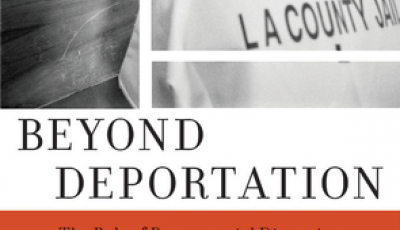Book Review: Beyond Deportation: The Role of Prosecutorial Discretion in Immigration Cases
Posted:
Time to read:
Guest post by Sara Blankenship, an attorney in Portland, Oregon. Her most recent work in immigration law focuses on family detention. She is an alumna of Lewis & Clark Law School and the Fletcher School of Law and Diplomacy, Tufts University.
Review of Beyond Deportation: The Role of Prosecutorial Discretion in Immigration Cases by Shoba Sivaprasad Wadhia (New York University Press, 2015)

Once establishing the now publicly known existence of prosecutorial discretion in immigration law, Beyond Deportation then explores, chapter by chapter, its origins, implementation, and evolution. The book focuses heavily on ‘the jewel of prosecutorial discretion’—deferred action—the decision to postpone prosecuting an individual in the United State without authorization. At its most luminous and transparent, deferred action examines and evaluates an immigrant’s life into designated and defined qualified component parts. Where is she from? Where is she now? How did she get here? How old is she? How is her health? Does she have a family? How is the health of her family? Is she employed? Is she in school? Does she have a criminal record? Wadhia reveals what are the government’s internally established deferred action questions, who is asking them, and what internal and external policies are driving the process. She also illustrates that while increased transparency in immigration law is vital to the system functioning justly, elements of prosecutorial discretion will always be somewhat of a black box simply because it is discretionary. The depth, breadth, exercise, and constitutionality of the government’s discretion will continue to be grey areas in immigration law. However, with Beyond Deportation there is now a starting point for understanding the administrative and judicial stances on these issues.
Wadhia’s work, especially her tireless Freedom of Information Act requests and commitment to forging inroads and relationships with immigration officials, is in many ways the start of a roadmap to free us from the bureaucratic mire surrounding these profound decisions that impact national identity, communities, and individual lives. The data she gathered on deferred action requests and approvals reveal that how an immigrant seeking deferred action answers the government’s questions is just as critical as where the immigrant is filing her request and what portion of DHS she is dealing with. For instance, Chapter 4, entitled ‘Deferred Action,’ shows that based on the limited data available, a deferred action applicant’s success appears to also be contingent upon whether she is dealing with the United States Customs and Immigration Service or Immigration and Customs Enforcement, what regional office she is applying to, and whether she is represented by an attorney. These additional factors set the stage for further research into the bureaucratic cultural differences between the various DHS departments, regional offices, and field offices as well as the impact of access to justice.
These factors also raise important social and political questions. For example, the data compiled thus far shows regional variations in the granting of deferred actions requests. On the one hand, should this variation be embraced, regional offices will retain a level of individual autonomy that in some cases will work in favor of those seeking deferred action and in other cases will be detrimental. On the other hand, minimizing regional variations will result in a lessening of discretionary autonomy, but perhaps greater consistency in deferred action decisions. This minimization of variation between DHS regional offices will undoubtedly shift the deferred action calculation somewhere towards the middle, between the level of acceptance desired by immigration advocates and the level of denial desired by restrictionists. This is just one of many questions Beyond Deportation raises, all of which are worthy of additional research and contemplation.
Wadhia closes Beyond Deportation with a chapter entitled ‘Reform.’ Here, she puts forth a number of pragmatic recommendations to improve the exercise of prosecutorial discretion including deferred action. Wadhia proposes that prosecutorial discretion decisions should be made as early in the enforcement process as possible; that the decision process must be made more transparent, including the adoption of practices such as simply informing the applicant about the outcome of her case; and that regulatory language for deferred action should be proposed and adopted pursuant to standard rulemaking procedures so as to create a transparent, level playing field for all deferred action applicants. These recommendations coupled with the numerous questions raised throughout the book should serve to encourage the reader to build upon the Beyond Deportation roadmap, whether it’s through research, advocacy, legal representation, or political engagement.
By tracing the ongoing effort to reveal the inner workings of the US immigration system to those that need to know it most—the public—Beyond Deportation is an important compendium in any immigration academic, practitioner, student, or activist’s library. Consisting partially of Wadhia’s previous groundbreaking law review articles on prosecutorial discretion, it can also serve as a quick reference book since the eight chapters can be read and utilized as stand-alone pieces. For instance, scholars familiar with prosecutorial discretion, but are perhaps seeking insight into the development of the Obama Administration’s Deferred Action for Childhood Arrivals can easily get up to speed through referencing Chapter 5. In addition, Wadhia meticulously refers to other portions of the book for further background and explanation, again making Beyond Deportation an excellent reference for those already familiar with prosecutorial discretion in immigration as well as for those new to the field. With Beyond Deportation, Wadhia has simultaneously created a short, accessible, and comprehensive primer on prosecutorial discretion in immigration while raising profound questions on the usage and evolution of this tool into one that is more transparent, humanitarian, and just.
Any comments about this post? Get in touch with us! Send us an email, or post a comment here or on Facebook. You can also tweet us.
__________
How to cite this blog post (Harvard style):
Blankenship, S. (2016) Book Review: Beyond Deportation: The Role of Prosecutorial Discretion in Immigration Cases. Available at: https://www.law.ox.ac.uk/research-subject-groups/centre-criminology/centreborder-criminologies/blog/2016/01/book-review-3 (Accessed [date]).
Share:








